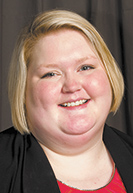Subscriber Benefit
As a subscriber you can listen to articles at work, in the car, or while you work out. Subscribe NowWith nothing but the clothes on his back and his cellphone, Ali Noori, his wife and 2-year-old daughter went to the airport in hopes of safely fleeing their country: Afghanistan.
The Noori family got through the airport with no bombs or gunfire, and for three days they waited for the plane to take flight.
Noori didn’t eat or sleep during those three days. Any food he was given, he gave it to his wife and daughter. When it got cold at night, they held their daughter close to keep her warm.
“I was more stressed than (worried about) eating or getting sleep,” he said.
After finally taking off in cargo planes squished in with thousands of other refugees, Noori and his family realized they first landed in Abu Dhabi, United Arab Emirates, after seeing a license plate.
After that, they had no clue where they were headed.
Like many Afghanistan refugees who came to the United States in September 2021, the Noori family landed in camps, where they stayed for about two months before moving on.
Now, Noori and his family are waiting again, but this time to see if their petition for asylum in the United States will be approved.
Move to Muncie
After Noori and his family arrived in the United States, they were in a camp in Virginia for a while until they moved into a trailer through the aid of the International Rescue Committee.
However, it was winter, and the bathroom was outside of the trailer.
Noori said he felt that wasn’t a good situation for his then-pregnant wife. So instead of continuing to receive aid from the IRC, they chose the independent route and moved to California.
The family lived in California for three months. Their rent for a one-bedroom apartment was $2,500, and Noori was working long hours at a 7-Eleven gas station. He said his mental state was horrible and he was constantly on edge.
“I was getting scared. I was lost,” he said.
Then one day, a friend called and told Noori about an Indiana city, Muncie. The friend told Noori about the cost of rent in Muncie, and about the growing community of refugees moving into the city.
Noori was intrigued, so his friend connected him with Bibi Bahrami, who is the founder of Muncie-based AWAKEN (Afghan Women and Kids’ Education & Necessities Inc.), a group dedicated to helping women and children in Afghanistan.
The group paid for the flight to Indiana and found a place in Muncie for Noori and his family to live, as well as a local family to connect with.
“If you compare me now with me in California, it is 1,000% change. I am so happy. I am very happy,” Noori said.
Now Noori and his family live in a Muncie apartment building with several other Afghan families. He is working to use his degree here, but for now works at a clinic and often translates when the refugees come in.
After work, he doesn’t go home.
Instead, he works for DoorDash so he can send money home to his parents, siblings and his wife’s parents.
Meanwhile, the Noori family applied for asylum and traveled to Chicago for their interview. They were told it would take four to five months until they would know if they were approved or not.
That was six months ago.
Waiting for asylum

According to Kelli Liggett, a partner at DeFur Voran LLP in Fishers, the wait the Nooris are experiencing is normal when it comes to immigration.
“We were told it would be expedited; that remains to be seen,” Liggett said. “Technically, February-ish would have been the 150 days that they promised, and that clearly didn’t happen. If they get it within a year, I’ll be thrilled. Unfortunately, ‘wait’ is kind of the name of the game with immigration in general.”
Liggett said all of her Afghan refugee clients have been interviewed for their asylum petitions but haven’t heard anything since. She said about three families submitted green card applications in Muncie and 15 asylum applications.
Families can file for Temporary Protected Status, but as the name implies, that only allows them to stay in the U.S. temporarily.
Still, “I’ve been recommending everyone who isn’t currently holding a green card to apply for TPS,” Liggett said. “It protects anybody from deportation and allows work authorization.”
If they obtain asylum, the refugees can then apply for a green card and, ultimately, U.S. citizenship. That also makes it easier to sponsor family members to come to the U.S.
Liggett noted that the Afghan refugees were on humanitarian parole through Operation Allies Welcome, and the Biden administration announced in May that it was establishing a process to re-parole eligible Afghan nationals. “As with any parole request,” the announcement from the Department of Homeland Security said, “these requests will be considered on a case-by-case basis for urgent humanitarian reasons and significant public benefit. Additional details regarding the process will be available soon.”

Rachel Van Tyle with Exodus Refugee Immigration in Indianapolis said she is seeing a similar situation in her work with Afghan refugees.
“I think that there’s just not a lot of finality to their cases yet. We filed, I think, 115 applications for asylum, and I’ve only had two responses. Thankfully, they were both approvals,” Van Tyle said. “We have two clients that are well on their way to permanent status.”
She noted that with the end of Title 42 — an immigration law that was designed to expel migrants at U.S. land borders for public health reasons during the COVID-19 pandemic — and an influx of migrants at the southern border, the system is getting even more backed up.
“We just have a lot of cases that are unresolved, and I think tying in what’s happening at the border, they are diverting a lot of those resources to the border to deal with the influx of migrants there,” Van Tyle said.
“And we’re going to continue to, I think, see a slowdown on the processing of other claims,” she continued. “And that means that those clients will stay in limbo longer.”
Van Tyle added that because cases aren’t moving, it’s going to take longer for families to reunify.
Noori said if his family’s asylum petition gets approved, they would like to sponsor the rest of his family to come to Muncie from Afghanistan.
Life in Indiana
Since they’ve been in Muncie, Noori’s wife gave birth to their 1-year-old son, and she’s now pregnant with another child due in August.
The family still doesn’t watch American TV, just YouTube videos of shows from their home.
Everything Noori learns about the how the legal immigration system works is through talking with other refugees and watching Afghan attorneys on TikTok.
He and his family go to the Almadina International Halal Foods market in Fishers sometimes for a taste of home. He said he hopes to get a job as a pharmaceutical representative, which is what he did in Afghanistan.
While Noori grew up in the city, he said many of the Afghan refugees grew up in villages and were right by the fighting, so they never went to school.
They can speak their language but cannot read or write it, he said.
“The Taliban was attacking from one side and the (U.S.) military was attacking from the other side, so they were getting killed, their kids were getting killed,” he said. “They never got the opportunity to go to school. That’s why a lot of them, they are not able to even read and write in our own language, which is why English is a little far for them.”
With his son being a U.S. citizen and another baby on the way, Noori said he knows that it would never be safe for them to go back to Afghanistan.
“There are (people in Afghanistan) growing up their kids with this (idea), ‘The United States is our number one enemy. You have to you have to kill them, or you have to be killed by them.’ If you get killed by them, it is also an honor for you. So this will never stop,” he said.
Noori said he chose to bring his family to the U.S to give them a chance at a better future.
But for now, he waits.•
Please enable JavaScript to view this content.

